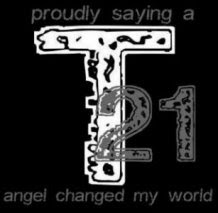Getting Your Foot In the Door and Growing It
Our Early Intervention Social Worker opened the door for us. Ellen -- also known as Professor Paige -- who doubles as an adjunct Professor at Nassau Community College scheduled me, the boys and my old soul to meet and speak with her Psychology for Exceptional Children Class about our life experience including what it's like to have children or a sibling with Down syndrome and how Early Intervention fits into and affects our lives and relationships. The following semester, Ellen scheduled us to speak with her students again as well as extending an invitation to another Psychology class to join in on our unscripted and personal chat sessions. The students listened to me talk about our daily lives, our hopes and dreams, our victories and our difficulties. The conversation was not scripted but was largely directed by impromptu questions asked by students who, all the while, were playing and conversing with the boys and Olivia as well. Many students had never actually met someone with Down syndrome before meeting Brian and Michael. Some were somewhat familiar with it because an uncle, aunt or older family member had it. And there was, occasionally, an enlightened student that had a younger sibling with Down syndrome who was growing up with all the advantages that modern developmental science offers children with special needs today. For most though, all they knew of Down syndrome prior to our visit was what they'd heard from their various professors (not always enlightened, though Professor Paige surely is) and what they'd read in text books, which are predominantly still written from a historical standpoint as opposed to the down syndrome of today... significantly changed with the advent of Early Intervention.
Invariably, the students openly expressed that Brian and Michael "seem like normal todders" to which Professor Paige replied, "They are not LIKE normal toddlers! They ARE normal toddlers. They just happen to have Down syndrome." Yes, Down syndrome impacts their lives but they could easily see that it does not change the fact that Brian and Michael are two little boys who play and grow and learn. I dare say, the experience had a positive and mind-changing affect on every student we met with. This was confirmed when another professor at the same college inquired when she overheard some of her students talking amongst themselves about the impact our visit had on them. As luck would have it, that professor had a child with special needs. Though she did not know us, she knew her child's special education teacher treated identical twins with Down syndrome so she mentioned it to her. It so happens that her special ed teacher is also ours! And, she called excitedly to tell me that the students told their professor that meeting Brian and Michael had been an extraordinary experience that they will NEVER forget!
I KNOW this is true. It is why I chose this venue to pursue my advocacy efforts on behalf of children with Down syndrome. You see, I had such an experience many many years ago! 27 years ago to be exact! I sat in a college classroom just like theirs studying Behavioral Psychology. Interestingly, I cannot recall the professor's name but I will never forget the name of his adopted son... Benjamin. Nor the day I met Benjamin when his Dad brought him to class, as a guest one day, to help demonstrate the extraordinary possiblities Behavior Modification techniques brought to the lives of people like his son. Benjamin had autism. And, he made noble attempts with some success to interact with us. He was, perhaps, 9 years old and we were inept 19-year-olds, students who'd barely left the nest at that point. I am, beyond a doubt, still today touched by the extraordinary experience of meeting Benjamin. Putting a face, a child, a person, to what I thought of then as a scary diagnosis.
The boys' speech therapist also happened to be a college professor at another local college, Adelphi University. After hearing of our visits, she too scheduled us to come and speak with her speech-language classes about the Early Intervention experience from the family's point of view and about the impact each therapist has on the family... Each therapist is not only treating the child/client but, in fact, they are treating the whole family. While their therapeutic actions are meant to be repeated by the family members to help foster development, all of their beliefs, hopes, words and actions are also being ingrained into each family's mindset as well.
Our visits were rewarding for the students as well as for me and my family. By exposing these students -- the future therapists and special educators -- to Brian and Michael I knew we were influencing their beliefs about what Down syndrome is and is not. And, changing their view of what a person with Down syndrome is and is not... and what such a person could grow to be with their help and support! As such, I decided to expand my circle of influence to include more college students... the future therapists and educators of children with special needs.... The future neighbors, parents, aunts, uncles and friends of people with Down syndrome.
I happen to live in a very congested area of the country so there are many local colleges that are within more-than-reasonable round-trip travel distance for me and my children without totally disrupting our therapy and education schedules. I googled the name of each of these colleges and perused the degree offerings and departments. I finally settled on the following departments within each school: Psychology, for access to the future therapists and social workers; Education/Special Education, where I could influence the future teachers of both general and special education; Speech/Language, to ensure the future speech and hearing teachers would hear my spiel and not prejudge children like mine; and Nursing, so that the medical profession could first see a child with Down syndrome as an individual before seeing them as a diagnosis. Then, for each department selected, within each college, I identified the department chairperson's name, title, address, phone and email address and commited them all to a spreadsheet. Where any critical information -- especially email address -- was missing, I telephoned to gather the pertinent data needed. Finally, I sent a compelling letter, via email, to each of these individuals with an offer to bring my special family to meet and speak with their students.
NOTE: Next time I'll be sharing the actual e-mail I sent to the college department chairs and, finally, I'll write up and post the general message I carry to the students. (I have key messages and experiences I consistently share but the talk is always unscripted.)
Subscribe to:
Post Comments (Atom)


















Simply amazing work. I applaud you! And again, thanks for sharing. Looking forward to more.
ReplyDeleteYou are my hero- incredible and inspiring. Do you tell the boys now that they have Down Syndrome? That is a dilemma I struggle with- any thoughts?
ReplyDeleteI'm glad Paige was nice to you. She called CPS on us. Of course, it was unfounded.
ReplyDelete